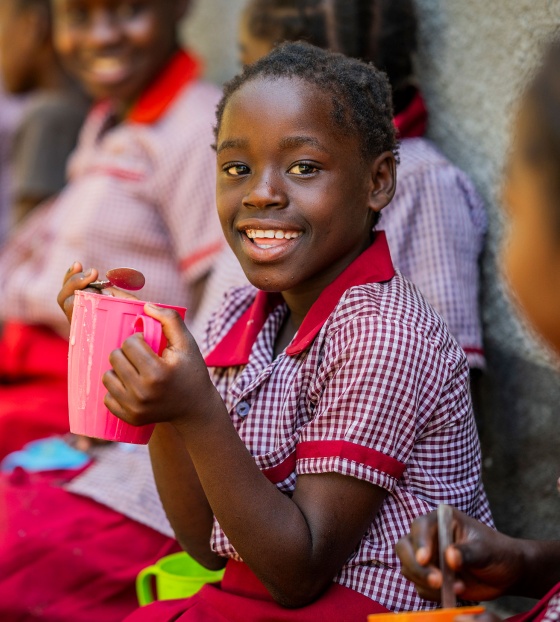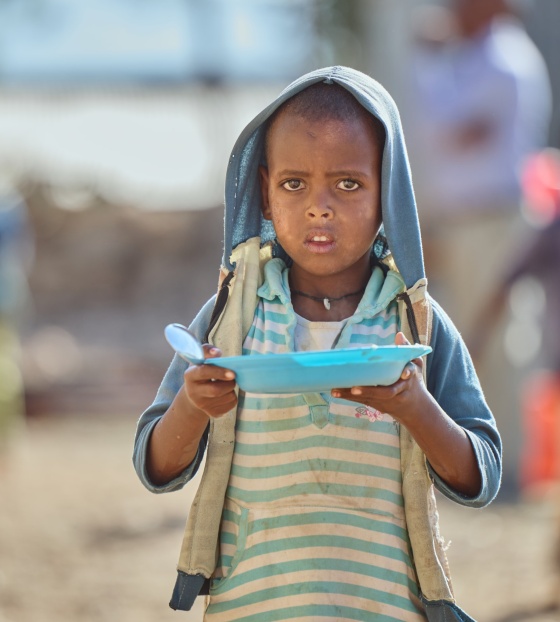

Live Aid: 40 Years On - Ethiopia Faces Hidden Humanitarian Catastrophe
While the world looks away, Mary’s Meals stands with the children of Tigray
A bloody conflict in Northern Ethiopia took the lives of 600,000 people and forced over 1 million to flee to Internally Displaced People camps. Violence, poverty, climate change and drought have destroyed decades of progress. A ceasefire was officially declared at the end of 2022 but with tens of thousands still displaced from their homes and millions in need of food aid, families have been left in the depths of despair. Devastating aid cuts have only worsened the situation.
On 13 July 1985, concerts in London and Philadelphia, led by Bob Geldof and Midge Ure, propelled Ethiopia’s famine to the forefront of global consciousness. Over 1.5 billion viewers tuned in to Live Aid to raise more than £114 million for famine relief. Almost 8 million people became victims of the famine and more than a million died.
Yet 40 years after Live Aid, Ethiopia's cry is falling on deaf ears, in large part due to a media blackout in the region which means a crippling hunger crisis remains largely unseen. An estimated 4.5 million people in the Tigray region urgently need food aid.
Currently, we are providing school meals to 240,000 children in Tigray every day, more than any other global organisation.
An unfolding famine
The story started four decades ago, when our Founder, Magnus MacFarlane-Barrow, was inspired by Live Aid to take action and help those in need.
Magnus says: “In 1985, whilst watching the original Live Aid concert as a teenager, I found myself moved to make my very first donation to a charity. The deeply disturbing images of emaciated children in Tigray, Ethiopia, accompanied by an impassioned, expletive-laden plea by Bob Geldof, moved my young friends and I to act.
“I could never have imagined that four decades later I would find myself in Tigray, Ethiopia, face to face with similarly gaunt children suffering acute malnutrition amidst another unfolding famine."
Substantial aid cuts have severely hampered the humanitarian response in the region. In April, the World Food Programme announced the suspension of food aid for 650,000 women and children living in hunger in Ethiopia, and warned food aid for a further 3.6 million people in the country was at risk.
When cuts were first announced, Magnus commented: “They are happening at the worst possible moment, whilst the world’s poorest communities are already suffering extreme hunger as a result of conflicts and climate change.”
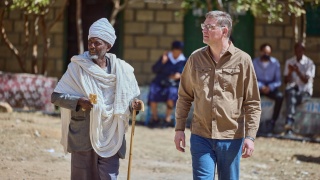
Having recently visited Tigray and witnessing the deepening crisis first-hand, Magnus says: “Around 600,000 people died in the conflict, a number that dwarfs the death toll of much more prominent wars of our time. Adding to the enormity of the necessary recovery, a prolonged drought created an enormous hunger crisis.
“In a school playground I chatted with two 10-year-old girls who told me they were only in class because of Mary’s Meals. I was heartened to see that the meals were having the desired impact.
“And then my heart broke when I learned that those same two girls had been sharing their school meal each day with hungry children begging at their school gate – despite their own uncertainty about whether there would be any food at home later that day.”
A beacon of hope
Working with our trusted local partner since 2017, we have established community-owned school feeding programmes in Tigray and provided hot meals and other essential support during the two-year Tigray War which raged between November 2020 and 2022.
When the war broke out, our school feeding programmes reached around 30,000 children. After an emergency appeal last year and with the generous response of our supporters, including the Band Aid Charitable Trust, eight times as many children are now receiving Mary’s Meals in Tigray every school day.
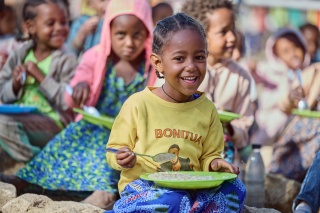
On the Frontlines of Hunger
In a bid to raise awareness of Ethiopia’s unfolding humanitarian crisis, we have produced a powerful new documentary.
On the Frontlines of Hunger tells the unknown story of the people of Tigray in their own voices. Narrated by Emmy and Golden Globe-nominated actress Roma Downey, the film features an in-depth interview with musician and activist Sir Bob Geldof. It also includes rare footage from Live Aid in 1985, and testimonies from those living and working in Tigray today.
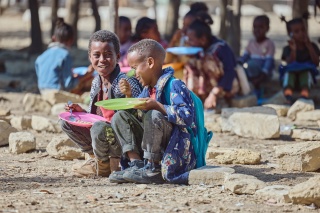
The first and only documentary of its kind, made possible by our longstanding presence in Tigray, captures unfiltered testimonies of people’s struggle and resilience. The film features Sisters who transformed a school meals programme into a lifeline for tens of thousands of war refugees, including formerly affluent families reduced to begging and children sharing their only meal of the day with those in even greater need.
As funds allow, our partner is ready to extend the programme to areas of great need across the Tigray region as we strive to reach more children with daily meals in school.
